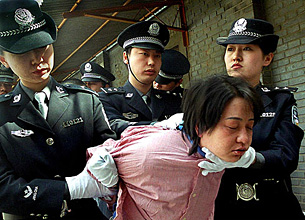 |
 |
 |
 News from Around the Americas | June 2007 News from Around the Americas | June 2007  
With New Law, China Reports Drop in Executions
 Jim Yardley - NYTimes Jim Yardley - NYTimes


| | A prisoner is led to her execution immediately after being sentenced to death in Beijing in April 2001. (AFP) |
Beijing — China, which puts more inmates to death than the rest of the world combined, is reporting fewer executions this year after reinstating a requirement that every death case be reviewed and approved by the country’s highest court.

Ni Shouming, a spokesman for the Supreme People’s Court, said Friday that lower courts across the country were reporting declining numbers of executions, though he did not provide any specifics.

He told China Daily, the official English-language newspaper, that the national figures dovetailed with a recent survey of two lower courts in Beijing, which found a 10 percent drop in executions during the first five months of 2007.

Human rights experts have estimated that China executes 10,000 to 15,000 inmates a year. Beijing does not release official figures, which are designated as a state secret.

But in recent years, the government has come under increasing international and domestic pressure to improve its death penalty system. Cases of wrongful executions have incited national outrage.

John Kamm, a human rights campaigner who has worked for years in China, said Chinese leaders were also motivated to put a better face on the system as the 2008 Olympics drew near. He estimated that executions had actually dropped sharply — even by 40 percent — in the six years since Beijing was chosen to be the host city for the Olympics.

He said two informed sources in China had told him that about 7,500 people were executed in 2006.

“The Olympics is not the only reason,” Mr. Kamm said in a telephone interview Friday from Hong Kong. “When you execute somebody wrongly, and a lot of people have been executed wrongly, you are going to make a lot of people unhappy.”

Mr. Kamm, director of the Duihua Foundation in San Francisco, which monitors cases of political prisoners in China, said he expected the number of executions to continue to decline now that the Supreme People’s Court had reclaimed final authority. He said that lower courts would be forced to use greater discretion in applying the death penalty, and that the high court could return certain cases for retrial.

Mr. Ni, the high court spokesman, told China Daily that courts were already more conservative in applying capital punishment.

“The lower courts have to be more prudent now,” Mr. Ni said. “If a case is sent back for a retrial by the highest court, it not only means the first judgment is wrong, but also a matter of shame for the lower court.”

China remains committed to capital punishment. Last year, Prime Minister Wen Jiabao said the country had no plans to repeal capital punishment, noting widespread public approval of it.

But the public has also increasingly demanded fairness from a system in which fewer than 1 percent of all criminal defendants are acquitted.

Legal analysts in China note that the new authority assumed by the Supreme People’s Court is not actually new. Before 1981, death penalty cases were reviewed by the high court.

But Deng Xiaoping, then China’s paramount leader, became so concerned about a nationwide crime wave that appeals in capital cases were shifted away from the high court and given to the provinces.

The result was a fast-track criminal justice system. Capital defendants were tried in a lower-level court; their appeals were handled by the province’s High Court; and then that same High Court handled the final reviews.

“The problem was that the High Court was serving both as the appeals court and the final review of the case,” said Keith Hand, a senior fellow with the China Law Center at Yale University. “The chance that a court would reverse itself was very small.”

Xiao Yang, chief justice of the Supreme People’s Court, told state news media this year that China would “never again” grant such power to provincial courts. “A case involving a human life is a matter of vital importance,” Mr. Xiao said.

The Supreme People’s Court regained its authority on Jan. 1. Legal scholars in China have predicted that executions may fall by 20 percent to 30 percent once the change is fully absorbed by the criminal justice system.

Reformers, meanwhile, are trying to reduce the number of crimes eligible for death sentences. Currently, China has more than 60 capital offenses, ranging from murder to public corruption and economic crimes. | 
 | |
 |



